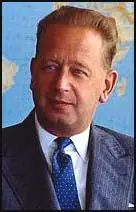Dag Hammarskjold

Dag Hammarskjold, the son of Hjalmar Hammarskjold, prime minister of Sweden, was born on 29th July, 1905. He studied at Uppsala University where he took a degree in the humanities. A talented linguist he spoke several languages including English, French and German. He took further degrees in economics (1928) and law (1930) and taught in 1933 began teaching at the University of Stockholm.
Hammarskjold worked on the Royal Commission on Unemployment. This was followed by the post of undersecretary in the Ministry of Finance (1936-1945) where he ran the Swedish Price Control Board. After the war Hammarskjold became head of the Risbank. While in this post he drafted the legislation that introduced the Welfare State in Sweden. It was during this period he was credited with being the first to use the term the "planned economy".
Although he was not a member of any political party, Hammarskjold joined the government and served in the foreign ministry. He favoured international economic cooperation and played an important role in the development of the Council of Europe and the Organization of European Economic Cooperation. He was also involved in the implementation of the Marshall Plan. However, he strongly resisted pressure for Sweden to join the North Atlantic Treaty Organization (NATO).
In 1949 Hammarskjold represented Sweden as a delegate to the United Nations and in 1953 was elected Secretary General of the organization. I this post he was involved in negotiating the release of American soldiers captured by the Chinese in the Korean War. Hammarskjold refused to submit to McCarthyism and rejected the idea put forward by John Foster Dulles that the Federal Bureau of Investigation should investigate the staff of the UN.
He was also involved in what he called "preventive diplomacy". This included attempts to solve the disputes in Palestine, Vietnam and Egypt. During the Suez Canal Crisis Hammarskjold managed to persuade the United Nations Security Council to condemn the actions of Israel, France and Britain.
In July 1960 Hammarskjold became involved in attempting to solve the civil war in the Congo. He arranged for a UN peace-keeping force to be sent to the region but in September 1961 fighting erupted between Katanga troops and the noncombatant forces of the UN. In an effort to secure a cease-fire he arranged to meet President Moise Tshombe. On 17th September 1961 Dag Hammarskjold was killed when his plane crashed close to Ndola airport. Hammarskjold's journal, Markings, was published in 1963.
Primary Sources
(1) Dag Hammarskjold, interviewed on Swedish radio in 1953.
From generations of soldiers and government officials on my father's side I inherited a belief that no life was more satisfactory than one of selfless service to your country - or humanity. This service required a sacrifice of all personal interests, but likewise the courage to stand up unflinchingly for your convictions. From scholars and clergymen on my mother's side, I inherited a belief that, in the very radical sense of the Gospels, all men were equals as children of God, and should be met and treated by us as our masters in God."
(2) Dag Hammarskjold, speech in 1956.
We are on dangerous ground if we believe that any individual, any nation, or any ideology has a monopoly on rightness, liberty and human dignity.
(3) Dag Hammarskjold, quoted in the book, Dag Hammarskjold - Custodian of Brush Fire Peace, by Joseph P. Lash (1961).
The basic rule that outer space, and the celestial bodies therein, are not considered as capable of appropriation by any state... and that international machinery would be established reflecting the overriding interest of the community of nations in the peaceful and beneficial use of outer space... I am all for the cessation of tests. I am all for the proper inspection of cessation of tests. I am all for the stopping of production... the arms race makes it impossible to look with equanimity upon the diplomatic game being conducted in which governments discuss and write letters and people are misled into assuming everything is all right. There is a point in the development when every time an initiative is taken in good faith and its possible consequences, possible values, are not fully explored, I have the feeling we have missed the bus. We should not be too sure that the road will remain open for buses all the time in the future.
(4) Brian Urquhart, Hammarskjold (1972)
Dag Hammarskjold was that most unusual of creatures, a truly good man. He was a man involved in momentous issues which he came to symbolize, even in death... By his skill, stamina, and resourcefulness he made a new art of multinational diplomacy. He gave a fresh dimension to the task of international service by the qualities of his mind and of his compassionate nature. He was an outstanding proponent of the conviction that our fate is what we make it.
